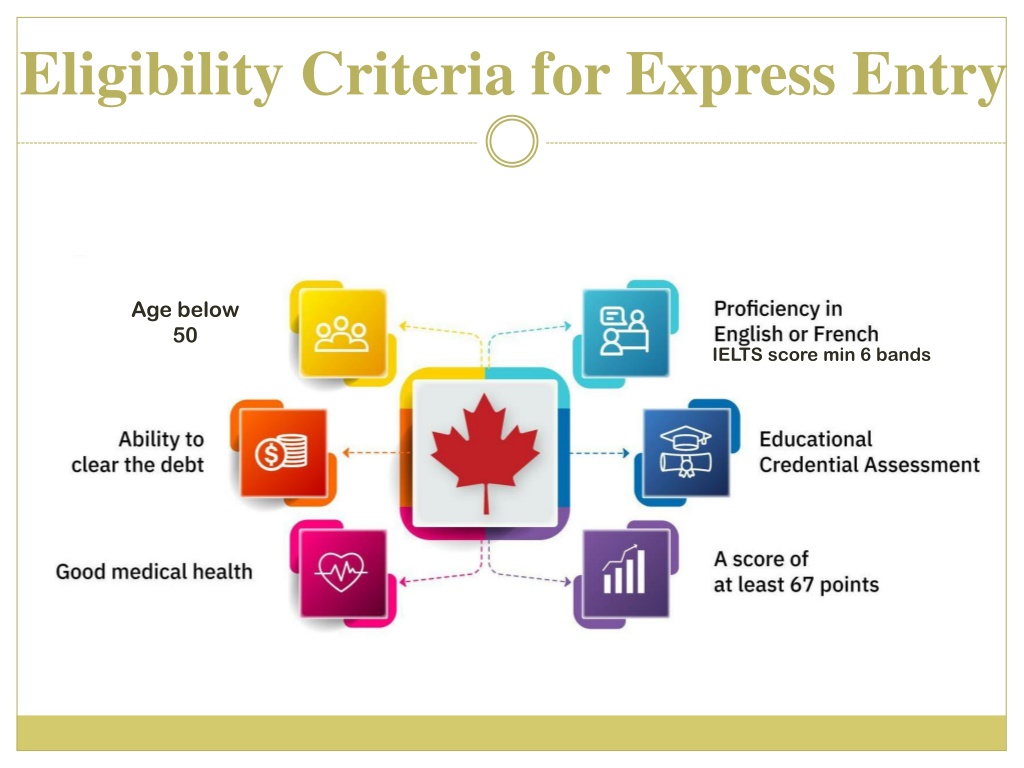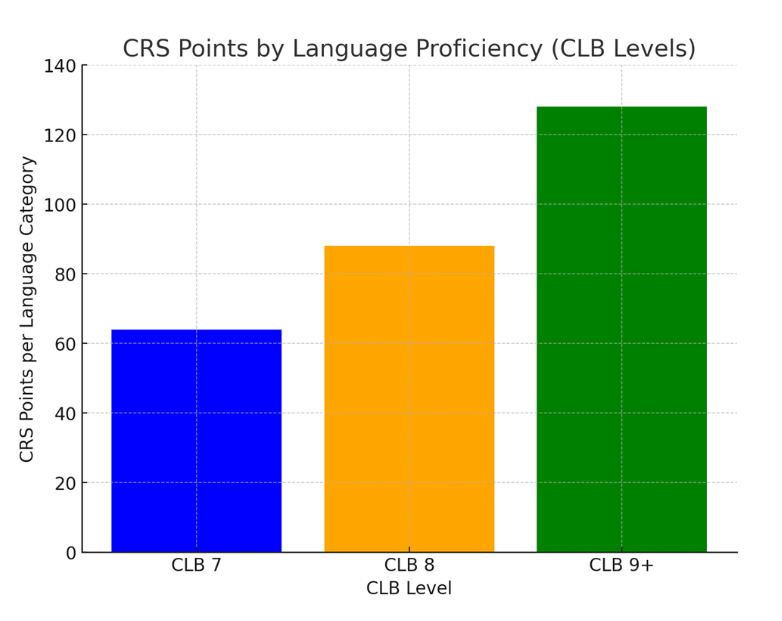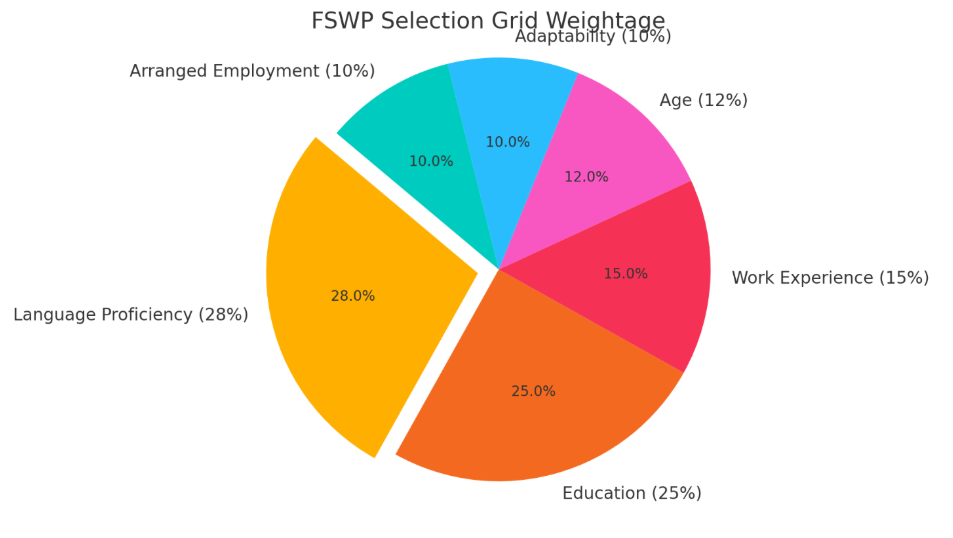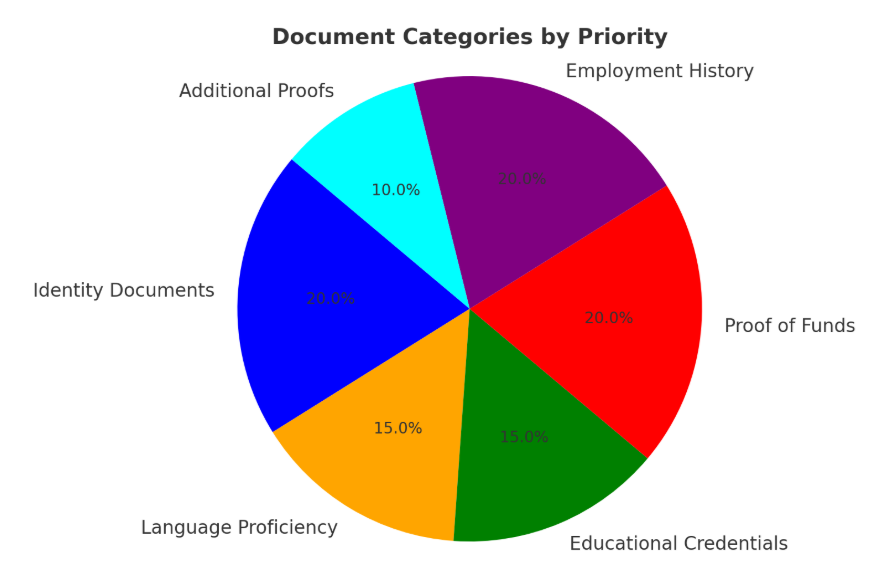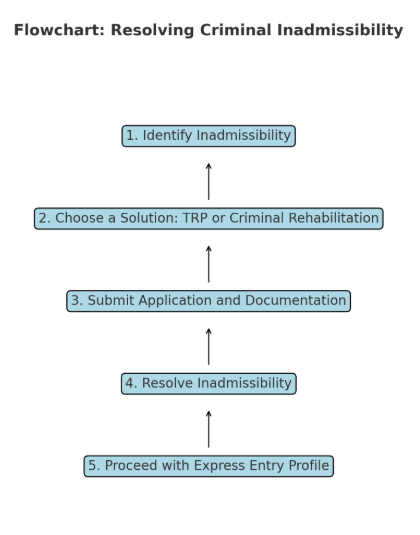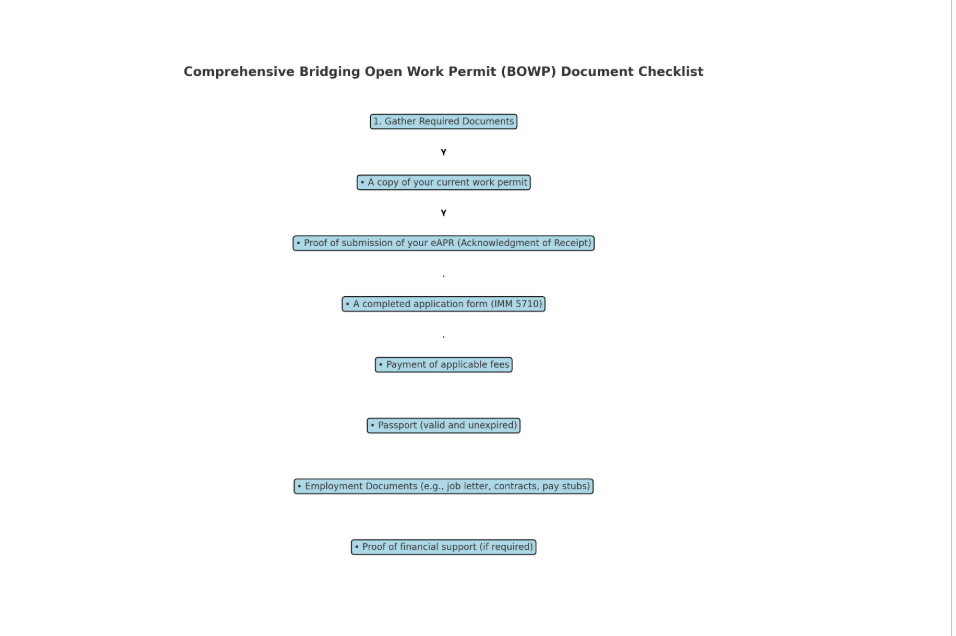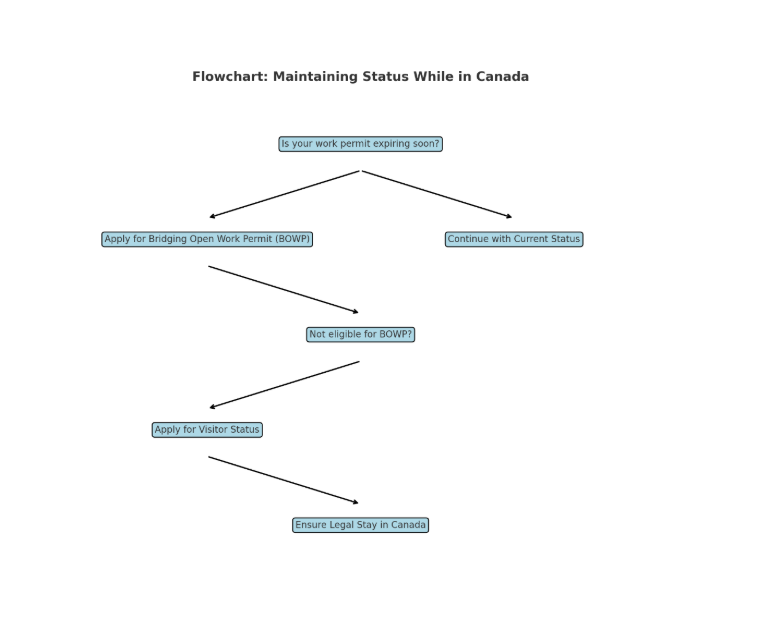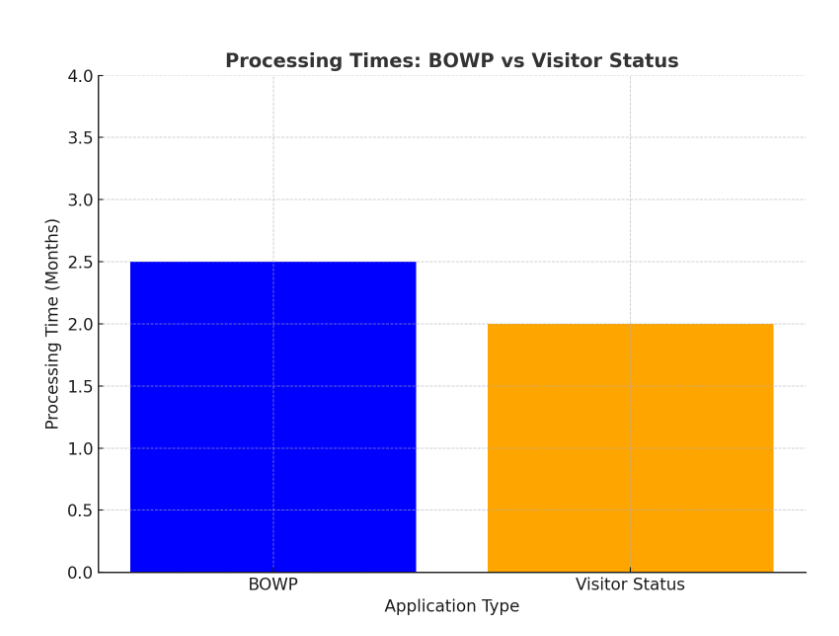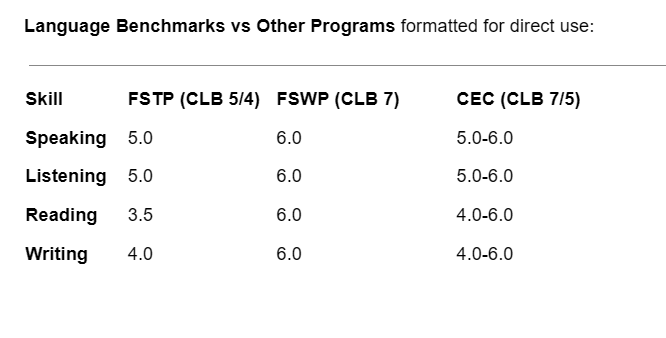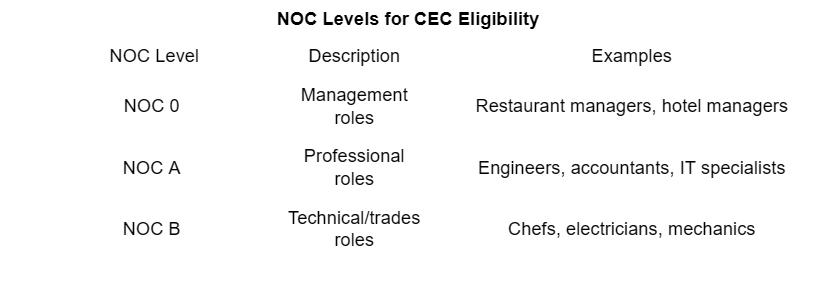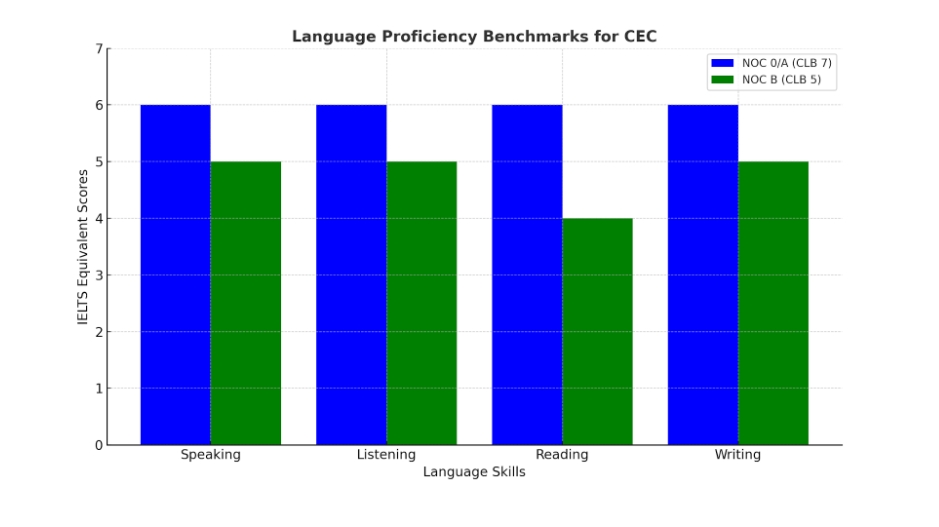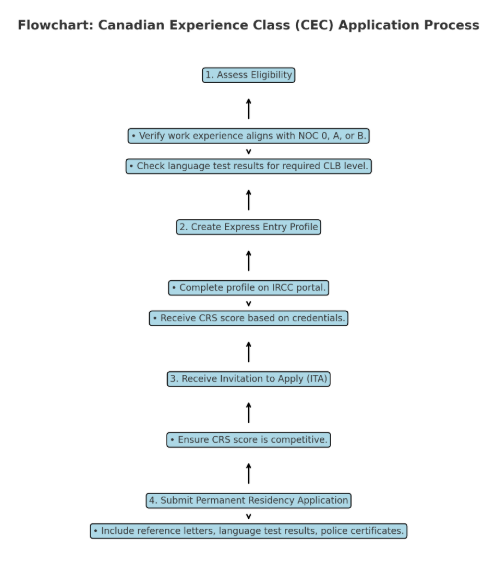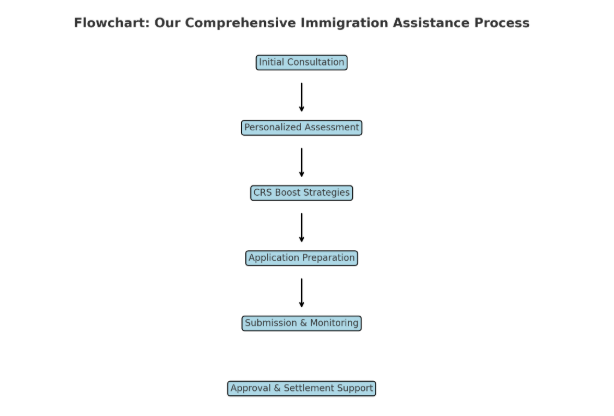Express Entry to Canada
The Ultimate Guide to Express Entry: Everything You Need to Know
Welcome to your ultimate guide to Canada’s Express Entry! This detailed resource provides an in-depth walkthrough of the system, strategies for improving your chances, and actionable tips to overcome challenges. By the end of this guide, you’ll have the tools, knowledge, and confidence to navigate Express Entry like a pro.
Let’s start with the basics:
What is Express Entry?
It’s Canada’s sleek, online immigration system introduced in 2015 to attract skilled workers globally. Think of it as a competitive game—only instead of scoring goals, you’re scoring CRS points. Express Entry is an innovative electronic system that has transformed the process of skilled worker immigration to Canada. This system provides an excellent opportunity for highly skilled individuals who wish to make Canada their permanent home.
This system provides an excellent opportunity for highly skilled individuals to make Canada their permanent home. The speed and efficiency of this system, along with its focus on selecting only the most qualified candidates, make it a highly desirable option for skilled workers looking to immigrate to Canada.
Moreover, this system has increased the chances of success for skilled workers who wish to immigrate to Canada. The CRS ranking system ensures that only the most qualified candidates are selected, increasing the chances of successful immigration.
Why Choose Express Entry?
- Fast Processing Times: Most applications are processed within six months.
- Flexibility: Multiple pathways tailored to different types of skilled workers.
- Transparency: Regular CRS draws ensure you know where you stand.
Express Entry manages three main immigration programs:
Eligibility Requirements
Federal Skilled Worker Program (FSWP)
To qualify under Federal Skilled Worker Program (FSWP):
|
Requirement |
Details |
|
Work Experience |
Minimum 1 year of continuous skilled work. |
|
Language Proficiency |
Minimum CLB 7 in English or French. |
|
Education |
High school diploma or higher. |
|
Selection Grid |
At least 67 points on the FSWP selection grid. |
Work Experience
- Requirement: A minimum of 1 year of continuous full-time skilled work experience (or the equivalent in part-time work) within the last 10 years.
- Details: Work experience must align with National Occupational Classification (NOC) skill levels 0, A, or B.
- NOC 0: Managerial jobs (e.g., marketing managers, restaurant managers).
- NOC A: Professional jobs (e.g., doctors, engineers, IT specialists).
- NOC B: Technical jobs and skilled trades (e.g., electricians, chefs).
Let’s use an example here. Priya, a software developer, worked full-time (40 hours/week) for two years. Her role falls under NOC A, meeting the work experience criteria. If she worked part-time (20 hours/week), she would need two years of part-time work to equate to one full-time year.
Language Proficiency
- Requirement: Achieve at least Canadian Language Benchmark (CLB) 7 in all four abilities: reading, writing, listening, and speaking.
- Details: Applicants can demonstrate language proficiency through approved tests like:
- English: IELTS or CELPIP.
- French: TEF or TCF.
- A CLB 7 corresponds to the following IELTS scores:
- Listening: 6.0
- Reading: 6.0
- Writing: 6.0
- Speaking: 6.0
Let’s use an example here. Raj achieved IELTS scores of Listening 6.5, Reading 6.0, Writing 6.0, and Speaking 6.5. His CLB level is 7, qualifying him for FSWP.
Education
- Requirement: At least a high school diploma or equivalent.
- Details: Applicants must obtain an Educational Credential Assessment (ECA) for foreign education to confirm it meets Canadian standards.
- Higher education (e.g., Bachelor’s, Master’s, PhD) earns more Comprehensive Ranking System (CRS) points.
Let’s use an example here. Sarah holds a Bachelor’s degree from India. She applies for an ECA through WES, which certifies her degree is equivalent to a Canadian Bachelor’s. This enhances her CRS score significantly.
Selection Grid
- Requirement: Achieve at least 67 points out of 100 on the FSWP selection grid.
- Details: Points are allocated based on six factors:
- Age: Younger applicants (e.g., 18-35 years old) earn maximum points.
- Education: Higher education leads to more points.
- Work Experience: Additional years of skilled work earn more points.
- Language Proficiency: Strong English and/or French skills increase points.
- Adaptability: Factors like a spouse’s language skills or having a job offer in Canada add points.
- Arranged Employment: A valid Canadian job offer boosts points significantly.
Let’s use an example here. Maria is 30 years old, holds a Master’s degree, has three years of skilled work experience, and scores CLB 8 on IELTS. She calculates her FSWP points as follows:
- Age: 12 points
- Education: 23 points
- Work Experience: 11 points
- Language Proficiency: 20 points
- Adaptability: 5 points
- Total: 71 points (qualified for FSWP).
Chart: Federal Skilled Worker Program (FSWP): Selection Grid Points Breakdown
|
Factor |
Maximum Points |
|---|---|
|
Age |
12 |
|
Education |
25 |
|
Work Experience |
15 |
|
Language Proficiency |
28 |
|
Adaptability |
10 |
|
Arranged Employment |
10 |
|
Total Possible Points |
100 |
Graph: Language Proficiency and CRS Impact
This bar chart shows how CLB levels impact CRS scores demonstrating the importance of achieving higher language benchmarks.
CRS Points by CLB Level
- CLB 7: 64 points (per language category)
- CLB 8: 88 points (per language category)
- CLB 9+: 128 points (per language category)
Pie Chart: Weightage of FSWP Factors
- Language Proficiency: 28%
- Education: 25%
- Work Experience: 15%
- Age: 12%
- Adaptability: 10%
- Arranged Employment: 10%
This visual shows applicants where to focus their efforts to maximize points.
Key Takeaways for Federal Skilled Worker Program (FSWP): Eligibility
The Federal Skilled Worker Program (FSWP) is a cornerstone of Canada’s Express Entry system. To maximize your chances of success, it’s crucial to not only meet the requirements but also strategically enhance your application. Here’s a deeper dive into the key takeaways.
1. Meeting Federal Skilled Worker Program Requirements: The Gateway to Express Entry
Meeting the Federal Skilled Worker Program eligibility criteria is a critical first step to entering the Express Entry pool. Each requirement—work experience, language proficiency, education, and the selection grid—acts as a gatekeeper. Let’s expand on why each factor matters:
- Work Experience:
- Skilled work experience (NOC 0, A, B) ensures that you bring value to Canada’s labor market.
- Continuous, full-time employment over one year demonstrates consistency and reliability.
- Diversifying your work experience across roles or countries can further strengthen your application by showcasing adaptability.
- Language Proficiency:
- A minimum CLB 7 ensures effective communication in English or French, which is essential for integration into Canada’s economy and society.
- Higher language scores not only improve Federal Skilled Worker Program (FSWP) eligibility but significantly boost CRS points.
- Education:
- Canadian equivalency through ECA reports ensures your foreign education is recognized and valued.
- Higher education levels like Master’s or PhDs maximize CRS points and demonstrate advanced skills.
2. Prioritizing Strong Language Scores and Educational Equivalency
Both language proficiency and education are heavyweights in the CRS scoring system. By prioritizing these areas, applicants can position themselves for success:
Language Scores
- Why It Matters:
- Language proficiency accounts for up to 160 CRS points (core factors) and additional points for French proficiency.
- Higher language benchmarks unlock points in combinations, such as adding points for Canadian or foreign work experience.
- How to Improve:
- Retake language tests like IELTS or CELPIP after targeted preparation to achieve CLB 9 or higher.
- Enroll in language training programs, focusing on weaker areas (e.g., writing or speaking).
- Consider learning French to earn up to 50 additional CRS points.
Educational Equivalency
- Why It Matters:
- Education impacts both the Federal Skilled Worker Program (FSWP) selection grid (up to 25 points) and CRS score (up to 150 points).
- Canadian credentials or recognized foreign qualifications demonstrate readiness to contribute to Canada’s economy.
- How to Optimize:
- Complete short-term Canadian certifications or diplomas to add educational value and points.
- Ensure your ECA report accurately reflects your highest qualification—sometimes additional documentation can enhance its value.
Case Study:
- Arjun holds a Master’s degree from India and initially scored CLB 7 on IELTS. After retaking the test and achieving CLB 9, his CRS score increased by 72 points, moving him into the competitive range for an ITA.
3. Using NOC Classification and ECA Reports Strategically
Navigating tools like National Occupation Code (NOC) classification and ECA reports ensures that your qualifications align with Canadian standards, maximizing both eligibility and competitiveness.
NOC Classification
- Why It Matters:
- The National Occupation Code (NOC) system categorizes occupations based on skill type and level, ensuring you meet the FSWP’s requirement for skilled work.
- Misclassification can lead to rejections, even if you have valid work experience.
- How to Use It:
- Cross-reference your job title and responsibilities with the NOC database to identify the correct code.
- Ensure your reference letters from employers explicitly describe duties matching the National Occupation Code (NOC)’s definition.
ECA Reports
- Why It Matters:
- Foreign education must be equivalent to a Canadian credential to qualify for points.
- ECAs validate the legitimacy and comparability of your degree.
- How to Use It:
Pro Tip: Both National Occupation Code (NOC) and ECA alignment are critical not only for Federal Skilled Worker Program (FSWP) eligibility but also for showcasing your compatibility with Canada’s labor market.
4. Strategic Planning for Long-Term Success
By meeting and exceeding Federal Skilled Worker Program (FSWP) requirements, applicants set themselves up for Express Entry success. Consider these strategies for long-term planning:
- Focus on High-Impact Areas:
- Language scores and education yield the highest CRS points.
- Address weaknesses in advance—e.g., enroll in training programs or gain additional work experience.
- Leverage Provincial Nominee Programs (PNPs):
- Provincial Nominee Programs (PNP) streams often have lower thresholds for language or CRS points.
- Apply strategically to provinces seeking your skills.
- Stay Informed:
- Follow updates to National Occupation Code (NOC) classifications and CRS draw trends.
- Regularly review and update your profile for any improvements.
Key Takeaway Recap
- Foundation of Express Entry: Meeting Federal Skilled Worker Program (FSWP) requirements ensures eligibility and boosts confidence.
- High-Impact Areas: Prioritize language proficiency and education to maximize CRS points.
- Strategic Use of Tools: Use National Occupation Code (NOC) classification and ECA reports to align with Canadian standards and strengthen your application.
Document checklist for Express Entry
When it comes to applying for Express Entry, submitting the right documents is as critical as meeting the eligibility requirements. Think of these documents as the foundation of your application. They prove your identity, skills, work experience, language proficiency, and financial capability to settle in Canada. Missing or incomplete documentation can lead to delays or even rejection of your application.
Why is the Document Checklist Important?
The document checklist is designed to ensure you provide IRCC (Immigration, Refugees and Citizenship Canada) with all the necessary information to process your application efficiently. Each document serves a specific purpose:
Submitting a complete and well-organized document package shows professionalism and increases your chances of approval.
How to Prepare for Document Submission
- Understand the Requirements: Carefully review the list of required documents for your specific pathway (e.g., FSWP, FSTP, or CEC).
- Gather Early: Some documents, like police certificates or Educational Credential Assessments (ECA), can take weeks to process. Start early to avoid delays.
- Organize and Label: Arrange documents in the required order, clearly label files, and scan them in high quality.
- Check Expiry Dates: Ensure documents like language test results and passports are valid.
- Translations: Translate any non-English/French documents through certified translators and include an affidavit.
Now that you know why these documents matter, here’s a detailed checklist to guide your preparation. Each item is critical, so ensure no document is left behind.
1. Identity and Personal Information
- Passport (valid and unexpired, including all relevant pages with stamps or visas).
- Birth Certificate (if applicable).
- Marriage Certificate (if married or in a common-law partnership).
2. Language Test Results
- IELTS (General Training), CELPIP (General), or TEF/TCF (for French proficiency).
- Ensure the test results are valid (less than two years old at the time of application).
3. Educational Credentials
- Degrees, diplomas, and certificates (originals or certified copies).
- Educational Credential Assessment (ECA) report from a designated organization (e.g., WES, IQAS).
4. Proof of Funds
- Recent bank statements (covering at least six months).
- Investment statements (e.g., GICs, stocks, mutual funds).
- Letter from your financial institution outlining your account details and average balance.
- Property or asset valuations (if applicable).
5. Employment History
- Reference letters from past employers (on company letterhead, including roles, responsibilities, and duration of employment).
- Pay stubs or tax documents to substantiate work experience.
- Contracts of employment (if applicable).
6. Police Certificates
- Required for all countries where you have lived for 6+ months since turning 18.
- Ensure they are less than 6 months old at the time of submission
7. Medical Examination
- Conducted by an IRCC-approved panel physician.
- Includes physical exams, blood tests, and x-rays to ensure you meet Canada’s health requirements.
8. Proof of Relationship (if applicable)
- Birth certificates to prove relationships with dependents.
- Documentation proving common-law status (e.g., shared leases, bills, or joint bank accounts).
- Proof of sibling residing in Canada (e.g., sibling’s PR card or Canadian citizenship).
9. Proof of Arranged Employment (if applicable)
- Copy of the valid job offer.
- Labor Market Impact Assessment (LMIA) approval, if required.
10. Additional Supporting Documents
- Proof of provincial nomination (if applying through a Provincial Nominee Program).
- Proof of French proficiency for additional CRS points (TEF or TCF results).
- Documents proving adaptability factors (e.g., spouse’s language test results or Canadian work experience).
11. Travel History
- Copies of previous visas and travel stamps.
- A detailed travel history form outlining all international trips.
12. Other Documents
- Legal name change certificate (if your name has changed).
- Affidavit of explanation for any discrepancies in documents.
- Immigration refusal letters (if previously denied a visa to any country).
Key Notes
- Organize Your Documents: Arrange documents in the order required by IRCC and label them clearly.
- Scan in High Quality. Ensure all uploaded documents are scanned in color at a high resolution.
- Translate Non-English/French Documents: Use certified translators for any documents not in English or French and include an affidavit of translation.
Checklist Example for Express Entry
- Identity Documents
- Passport
- Birth Certificate
- Language Proficiency
- IELTS/CELPIP/TEF Results
- Educational Credentials
- Degrees, Diplomas, ECA Report
- Proof of Funds
- Bank and Investment Statements
- Employment History
- Reference Letters, Pay Stubs
- Additional Proofs
- Police Certificates, Medical Exam, Provincial Nomination
Document Categories by Priority
Here is a pie chart showing the relative priority of different document categories for the Express Entry application. Each category’s weight reflects its significance in the submission process.
Learn more about the Comprehensive Ranking System (CRS):
The Comprehensive Ranking System (CRS) is a points-based system that is used by the Canadian government to assess and rank candidates who have submitted a profile through the Express Entry system. The CRS assigns points to candidates based on various factors, such as age, education, language proficiency, work experience, and other relevant factors.
The highest-ranking candidates are then invited to apply for permanent residency in Canada through regular Express Entry draws. The CRS score is constantly changing as new candidates enter the pool and existing candidates improve their profiles.
The CRS system is designed to prioritize candidates who are most likely to succeed and thrive in Canada’s economy and society. Factors such as education, work experience, and language proficiency are particularly important in the CRS system, as they demonstrate a candidate’s ability to contribute to the Canadian workforce and integrate into Canadian society.

How Express Entry works:

Through this electronic system, interested candidates can submit their profiles and become eligible for a program managed by Express Entry. This system uses the Comprehensive Ranking System (CRS) to rank candidates based on various factors, including age, education, work experience, language skills, and other relevant factors. The CRS system ensures that only the most qualified and competent candidates are selected.
One of the significant advantages of the Express Entry system is its speed and efficiency. This system allows for a quick and streamlined process, making it possible for highly skilled individuals to receive an Invitation to Apply (ITA) for permanent residency approximately every two weeks.
Express Entry manages three immigration programs:
Federal Skilled Worker (FSW)
The Federal Skilled Worker (FSW) program is one of the three federal economic immigration programs managed through Express Entry in Canada. This program is designed for skilled foreign workers who have the necessary education, work experience, language proficiency, and other skills required to contribute to the Canadian economy and integrate into Canadian society.
To qualify for the FSW program, applicants must meet several eligibility criteria, including having at least one year of skilled work experience, a minimum level of language proficiency in English or French, and a certain level of education. Applicants must also obtain an Educational Credential Assessment (ECA) to confirm that their foreign education is equivalent to a Canadian degree, diploma, or certificate.
Applicants who meet the eligibility criteria are ranked based on the Comprehensive Ranking System (CRS) score, which takes into account several factors, such as age, education, language proficiency, work experience, and other factors. The highest-ranking candidates are then invited to apply for permanent residency in Canada through regular Express Entry draws.
The FSW program is a crucial part of the Canadian immigration system as it helps to attract highly skilled workers who can contribute to the Canadian economy and fill labor shortages in various industries. The program also supports the government’s goal of welcoming more immigrants who can help to build a more prosperous and inclusive society.
Federal Skilled Trades (FST)

The Federal Skilled Trades (FST) program is one of the three immigration programs managed through the Express Entry system, which is an online platform used by the Canadian government to manage and process applications for permanent residency from skilled workers.
The FST program is specifically designed for individuals who have work experience in certain skilled trades and wish to obtain permanent residency status in Canada. The program allows skilled tradespeople to bring their expertise to the Canadian workforce and contribute to the country’s economy and society.
To be eligible for the FST program, applicants must meet certain requirements, including having at least two years of full-time work experience in a skilled trade in Canada within the past five years. Additionally, they must demonstrate proficiency in either English or French, as well as meet the minimum language requirements set by the Canadian government.
One of the benefits of the FST program is that applicants are not required to have a job offer in Canada at the time of their application. However, they must meet certain requirements related to their skilled trade, such as holding a valid certification or license in their trade.
Moreover, the FST program is particularly advantageous for Canadian employers who are seeking skilled tradespeople to fill job vacancies. By providing a pathway to permanent residency for individuals with expertise in certain trades, the FST program can help Canadian employers fill job vacancies and meet their workforce needs.
Canadian Experience Class (CEC)

The Canadian Experience Class (CEC) is one of the three immigration programs managed through the Express Entry system, which is an online platform used by the Canadian government to manage and process applications for permanent residency from skilled workers.
The CEC is specifically designed for individuals who have gained work experience in Canada and wish to obtain permanent residency status. This program allows applicants to demonstrate their familiarity with Canadian culture and the Canadian workforce, as well as their ability to contribute to the country’s economy and society.
To be eligible for the CEC program, applicants must meet certain requirements, including having at least one year of skilled work experience in Canada within the past three years. Additionally, they must demonstrate proficiency in either English or French, as well as meet the minimum language requirements set by the Canadian government.
One of the benefits of the CEC program is that applicants are not required to have a job offer in Canada at the time of their application. This can be particularly advantageous for individuals who have already been working in Canada on a temporary work permit, as it allows them to transition to permanent residency without needing to secure a new job offer.
Moreover, the CEC program is particularly beneficial for Canadian employers who are seeking skilled workers to fill job vacancies. As the program targets individuals with Canadian work experience, employers can more easily identify candidates who are already familiar with the Canadian workplace and can quickly adapt to their new roles.
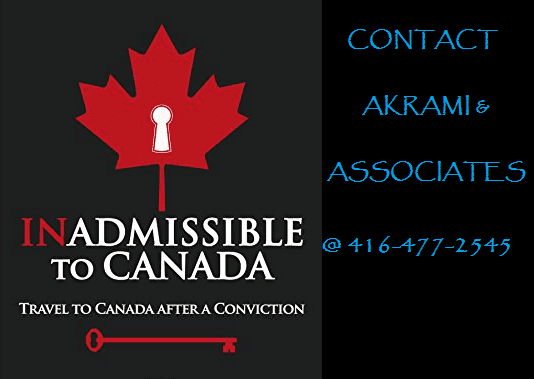
Overcoming Criminal Inadmissibility and Express Entry
If you have a criminal record and are worried about your eligibility for Express Entry, don’t lose hope. Inadmissibility due to past offenses is a challenge, but it’s not the end of your Canadian dream. Canada has built pathways—like the Temporary Resident Permit (TRP) and Criminal Rehabilitation—to help individuals overcome inadmissibility and move forward with their immigration goals.
Let’s tackle criminal inadmissibility, your options for resolving it, and strategies to boost your chances for Express Entry.
Why Criminal Inadmissibility Matters for Express Entry
Express Entry is Canada’s streamlined system for managing skilled immigration. However, it has strict criteria for admissibility. Criminal inadmissibility can be a barrier to entering or staying in Canada because the government prioritizes the safety and security of its citizens. This means that even minor offenses, such as DUIs, theft, or assault, can lead to inadmissibility.
Key Fact: Inadmissibility applies to both the principal applicant and their dependents. It’s crucial to address any potential issues before submitting your profile.
Your Options to Overcome Criminal Inadmissibility
1. Temporary Resident Permit (TRP)
A Temporary Resident Permit (TRP) is a temporary solution for individuals who are inadmissible to Canada but have a valid reason for entering the country.
- What is a TRP?
- A Temporary Resident Permit (TRP) allows you to enter Canada temporarily despite your inadmissibility.
- It is granted when the benefits of your entry outweigh the risks to Canadian society.
- When to Apply for a TRP:
- If your offense was recent and you’re not yet eligible for Criminal Rehabilitation.
- If you need to enter Canada urgently, for instance, for work or family reasons.
- Validity:
- Temporary Resident Permit (TRP) are issued for up to three years and can be renewed.
Example: Maria, a software developer, received a Temporary Resident Permit (TRP) to attend a job interview in Canada despite a recent DUI conviction.
2. Criminal Rehabilitation
Criminal Rehabilitation offers a permanent solution to inadmissibility and restores your eligibility for Express Entry.
- What is Criminal Rehabilitation?
- A process where the Canadian government determines that you are unlikely to commit further offenses, granting you permanent admissibility.
- It’s ideal for offenses committed more than five years ago.
- Eligibility for Criminal Rehabilitation:
- Your offense must be considered non-serious under Canadian law.
- At least five years must have passed since you completed your sentence, including fines, probation, or community service.
- Application Requirements:
- Police certificates from all countries where you’ve lived for six months or more since turning 18.
- Documentation related to your offense, including court records, sentencing details, and evidence of rehabilitation.
Example: John, convicted of theft over a decade ago, applied for Criminal Rehabilitation. His application included letters of reference, proof of steady employment, and no subsequent offenses. Once approved, he became eligible to apply through Express Entry.
Impact of Inadmissibility on CRS Scores
If you’re deemed inadmissible, you cannot enter the Express Entry pool. Even if inadmissibility is resolved through a Temporary Resident Permit (TRP) or Criminal Rehabilitation, improving your CRS score is critical to receiving an Invitation to Apply (ITA).
Key Takeaways
- Being inadmissible doesn’t mean you’re ineligible. Canada has pathways like Temporary Resident Permit (TRP) and Criminal Rehabilitation to address these issues.
- Act quickly and thoroughly. If you’re inadmissible, start the resolution process immediately. Delays can affect your eligibility for Express Entry.
- Post-admissibility, focus on boosting your CRS score. Improving language scores, gaining Canadian work experience, and targeting PNP streams can significantly enhance your profile.
Example Case Study: Overcoming Inadmissibility
Background: Alex, a welder from the UK, was convicted of assault 8 years ago. He completed his sentence 6 years ago.
Challenge: Alex was inadmissible to Canada but needed to apply for Express Entry.
Solution
- Applied for Criminal Rehabilitation, including police certificates and evidence of stable employment.
- Successfully resolved inadmissibility.
- Boosted CRS score by retaking IELTS and gaining a PNP nomination.
Outcome: Alex received an ITA within six months of resolving inadmissibility.

Step in determining whether you are inadmissible to Canada
1. Identify Inadmissibility
- Common Reasons for Inadmissibility:
- Past criminal convictions (e.g., DUI, theft, assault).
- Security-related issues.
- Misrepresentation on immigration documents.
- Actionable Steps:
- Obtain a police certificate from every country you’ve lived in for six months or longer since turning 18.
- Review Canada’s Criminal Code to see if your offense is considered a “serious crime” under Canadian law.
Example: A DUI conviction in your home country may result in inadmissibility. Start by understanding how this offense is classified in Canada.
2. Choose a Solution: TRP or Criminal Rehabilitation
Once you’ve confirmed inadmissibility, decide which pathway to resolve it:
Temporary Resident Permit (TRP)
- What It’s For:
- Short-term entry into Canada, despite inadmissibility.
- Ideal for urgent needs (e.g., attending a job interview, visiting family).
- Eligibility:
- There must be a compelling reason for your entry.
- Offenses committed recently and less than five years ago may qualify for a TRP.
- What It’s For:
- Permanent resolution of inadmissibility.
- Ideal for offenses committed more than five years ago.
- Eligibility:
- Five years must have passed since completing your sentence (including probation, fines, etc.).
- Evidence of rehabilitation (e.g., stable employment, no subsequent offenses).
3. Submit Application and Documentation
Both Temporary Resident Permit and Criminal Rehabilitation applications require thorough documentation. This is where most applicants face challenges due to missing or incomplete records.
- For TRP Applications:
- TRP application form (IMM 5708).
- Police certificates from all countries of residence.
- Detailed explanation of why your entry benefits outweigh the risks.
- Supporting documents for your purpose of visit (e.g., job https://thevisa.ca/canadian-temporary-residence/denied-entry-to-canada/criminal-rehabilitation/offer, family invitation).
- For Criminal Rehabilitation Applications:
- IMM 1444 form for Criminal Rehabilitation.
- Police certificates and court records for all offenses.
- Evidence of rehabilitation (e.g., employment history, character references).
- Proof of fines paid and sentence completion.
Tip: A lawyer or immigration consultant can help ensure your application is complete and persuasive.
4. Resolve Inadmissibility
This step involves waiting for a decision and, if necessary, addressing additional concerns raised by immigration officers.
- Processing Times:
- TRP: Can take weeks to months, depending on urgency and application location.
- Criminal Rehabilitation: Often takes 6-12 months or longer.
- What Happens Next:
- Approved TRPs allow temporary entry; you must abide by all permit conditions.
- Approved Criminal Rehabilitation clears inadmissibility permanently, allowing full eligibility for Express Entry.
Example: Alex applied for Criminal Rehabilitation for an assault conviction from 8 years ago. His approval took 9 months but resolved his inadmissibility permanently.
5. Proceed with Express Entry Profile
After resolving inadmissibility, you can proceed confidently with creating your Express Entry profile.
- Key Considerations:
- Police certificates must now show no unresolved criminal issues.
- You may need to provide proof of rehabilitation or TRP approval as part of your application.
Pro Tip: If you received a TRP, start working on qualifying for Criminal Rehabilitation for a permanent solution.
Maintaining Status While in Canada
When applying for permanent residency (PR) through Express Entry, one of the most critical concerns is ensuring you maintain legal status in Canada. Whether you’re waiting for your PR application to be processed or facing challenges like an expiring work permit, staying compliant with Canadian immigration rules is essential.
Why Maintaining Status Matters
Canada requires all temporary residents to maintain legal status while in the country. Failing to do so can lead to complications, such as:
- Being asked to leave Canada.
- Losing eligibility for certain immigration programs.
- Delays in PR application processing.
Bridging Open Work Permit (BOWP)
What is a Bridging Open Work Permit
A Bridging Open Work Permit (BOWP) allows individuals already in Canada to continue working while their PR application is being processed. It’s an open work permit, meaning it isn’t tied to a specific employer.
Eligibility for Bridging Open Work Permit (BOWP)
To qualify for a Bridging Open Work Permit (BOWP), you must:
- Be in Canada on a valid work permit.
- Have submitted an electronic Application for Permanent Residence (eAPR) under one of these programs:
- Have your current work permit expiring within four months.
- Have received an acknowledgment of receipt (AOR) from IRCC.
Example: Maria submitted her eAPR through Express Entry but her current work permit expires in 2 months. She applies for a BOWP to continue working legally while awaiting her PR decision.
Bridging Open Work Permit (BOWP) Application Process
- Gather Required Documents:
- A copy of your current work permit.
- Proof of submission of your eAPR (Acknowledgment of Receipt).
- A completed application form (IMM 5710).
- Payment of applicable fees.
- Submit Online Application:
- Log in to your IRCC account and select “Apply for a Work Permit.”
- Upload the necessary documents and pay the processing fee ($255).
- Wait for Approval:
- Processing times vary but typically take 2-3 months.
Key Takeaways
- Act Early: Apply for Bridging Open Work Permit (BOWP) status well before your current permit expires to avoid falling out of status.
- Choose the Right Pathway: If you can work, prioritize BOWP; if not, apply for visitor status.
- Stay Organized: Ensure all documents are complete and submitted on time.
Let’s compare the processing times for Bridging Open Work Permit (BOWP) and Visitor Status applications:
- BOWP: Average processing time is 2.5 months.
- Visitor Status: Average processing time is 2 months.
The Federal Skilled Trades Program (FSTP): Your Fast-Track to Permanent Residency
If you’re a welder, plumber, heavy-duty mechanic, or anyone skilled in a technical trade, Federal Skilled Trades (FSTP) could be your golden ticket to permanent residency in Canada.
Let’s dive into the nitty-gritty of this program, break it down into bite-sized pieces, and give you everything you need to know to make your application shine.
What Makes Federal Skilled Trades (FSTP) Unique?
The Federal Skilled Trades (FSTP) is designed to fill crucial gaps in Canada’s economy by bringing in skilled tradespeople who are in high demand. Unlike other Express Entry programs, Federal Skilled Trades (FSTP) focuses on your practical skills rather than advanced degrees or high language proficiency. It’s about what you can do with your hands—and how it can help Canada thrive.
Eligibility Criteria for Federal Skilled Trades (FSTP)
1. Work Experience
This is the backbone of your Federal Skilled Trades (FSTP) application.
- What’s Required?
- At least 2 years of full-time skilled work experience (or part-time equivalent) in a recognized trade within the last 5 years.
- Experience must align with National Occupational Classification (NOC) B.
- Eligible Trades Include:
- Industrial, Electrical, and Construction Trades: Welders, plumbers, electricians.
- Maintenance and Equipment Operation Trades: Heavy-duty mechanics, refrigeration technicians.
- Supervisors and Technicians: Agriculture, natural resources, mining.
Example: Meet John, a heavy equipment mechanic from the UK. With 3 years of work experience, his job under NOC 7312 qualifies him for FSTP.
2. Language Proficiency
FSTP doesn’t demand top-notch language skills. The benchmarks are practical and achievable.
- Requirement:
- CLB 5: Speaking and Listening.
- CLB 4: Reading and Writing.
- IELTS Equivalent for CLB 5:
- Speaking: 5.0
- Listening: 5.0
- Reading: 3.5
- Writing: 4.0
Why It Matters: Good communication skills are essential for workplace safety and teamwork. These minimums ensure you can handle basic job responsibilities.
Tip: If your language scores are low, consider retaking IELTS or CELPIP after some preparation to maximize your points under Express Entry.
3. Certification or Job Offer
One of these is mandatory for Federal Skilled Trades Program (FSTP) applicants.
- Option 1: Certificate of Qualification
- Issued by a Canadian provincial or territorial authority.
- Validates your skills and ensures they meet Canadian standards.
Example: Anita, a plumber from India, applies for certification in Alberta. Once approved, she’s eligible for Federal Skilled Trades Program (FSTP).
- Option 2: Valid Job Offer
- Must be for a full-time position lasting at least one year.
- Adds CRS points to your Express Entry profile.
Certification vs Job Offer
The Application Process: Step-by-Step
-
Check Eligibility:
- Match your work experience with NOC B codes.
- Ensure your language scores meet the minimum CLB requirements.
-
Gather Documentation:
- Proof of work experience (e.g., reference letters, contracts).
- Language test results (IELTS or CELPIP).
- Certificate of qualification or job offer.
- Passport and identity proof.
-
Create Express Entry Profile:
-
Receive an Invitation to Apply (ITA):
- ITAs are sent to candidates with the highest CRS scores in regular Express Entry draws.
-
Submit Your PR Application:
- Include police certificates, medical exams, and proof of funds.
Common Challenges and Solutions
-
Low Language Scores:
- Retake the test after preparation using online resources or coaching.
- Consider improving French skills for additional CRS points.
-
Difficulty Obtaining Certification:
- Research the specific process for your province.
- Gather detailed evidence of your skills (e.g., videos, portfolios).
-
Job Offer Challenges:
- Network with Canadian employers through online platforms like Job Bank or LinkedIn.
- Explore provincial streams under PNPs that don’t require job offers.
Key Takeaways
- FSTP is perfect for hands-on professionals in skilled trades.
- The program’s requirements are practical: focus on work experience, language scores, and either certification or a job offer.
- Use tools like NOC classification and Express Entry calculators to strengthen your profile.
The Canadian Experience Class (CEC): Your Pathway to Permanent Residency
The Canadian Experience Class (CEC) is one of Canada’s flagship immigration pathways under the Express Entry system. Designed for skilled workers who already have Canadian work experience, the Canadian Experience Class (CEC) recognizes their contribution to the economy and their integration into Canadian society. Think of it as Canada’s way of saying, “You’ve already proven you can thrive here—let’s make it permanent!”
Why Choose the Canadian Experience Class?
- Canadian Experience Class (CEC) applications are processed quickly, often within six months, making it one of the fastest routes to permanent residency.
- Unlike other Express Entry programs, Canadian Experience Class (CEC) applicants don’t need to show proof of settlement funds, which simplifies the process.
- Applicants with Canadian work experience have already adapted to the country’s work culture, making them ideal candidates for PR.
Eligibility Criteria for the Canadian Experience Class
To qualify for the Canadian Experience Class (CEC), you must meet the following requirements:
1. Work Experience
Your work experience is the cornerstone of your Canadian Experience Class (CEC) application.
- Requirement: At least 1 year of full-time skilled Canadian work experience within the last 3 years.
- Full-time work means at least 30 hours per week.
- Equivalent part-time work (e.g., 15 hours/week for 2 years) also qualifies.
- Eligible Jobs:
- Jobs classified under National Occupational Classification (NOC) levels 0, A, or B.
Example: Sarah worked as a restaurant manager (NOC 0) in Toronto for 12 months. Her position qualifies her for the CEC under the work experience requirement.
2. Language Proficiency
Language proficiency is the second key component of Canadian Experience Class (CEC) eligibility. It ensures that applicants can effectively communicate in their workplace and integrate into Canadian society.
- Requirement:
- CLB 7 for NOC 0 or A roles.
- CLB 5 for NOC B roles.
- IELTS Equivalent for CLB 7:
- Speaking: 6.0
- Listening: 6.0
- Reading: 6.0
- Writing: 6.0
- IELTS Equivalent for CLB 5:
- Speaking: 5.0
- Listening: 5.0
- Reading: 4.0
- Writing: 5.0
Tip: Higher language scores not only meet eligibility requirements but also significantly boost your CRS score under Express Entry. If you’re aiming for higher points, consider retaking your language test after focused preparation.
Language Proficiency Benchmarks for Canadian Experience Class
Here is a bar chart illustrating the Language Proficiency Benchmarks for Canadian Express Class. It compares the IELTS equivalent scores required for:
- NOC 0/A (CLB 7): Higher language proficiency for professional and managerial roles.
- NOC B (CLB 5): Lower language benchmarks for technical and trade roles.
How to Apply for the Canadian Experience Class
- Assess Your Eligibility:
- Verify your work experience aligns with NOC 0, A, or B.
- Check your language test results for the required CLB level.
- Create an Express Entry Profile:
- Log in to the IRCC portal and complete your profile.
- Receive a Comprehensive Ranking System (CRS) score based on your credentials.
- Receive an Invitation to Apply (ITA):
- ITAs are issued to the highest-ranked candidates in regular Express Entry draws.
- Submit Your PR Application:
- Include required documents like reference letters, language test results, and police certificates.
- Processing takes approximately 6 months.
Advantages of the Canadian Experience Class
- No proof of funds is required, unlike the Federal Skilled Worker Program (FSWP).
- Having already worked in Canada, Canadian Experience Class (CEC) applicants are well-positioned for long-term success.
- With simplified requirements, the Canadian Experience Class (CEC) is one of the most accessible pathways for skilled workers.
Key Takeaways
- The Canadian Experience Class (CEC) is ideal for skilled workers with recent Canadian work experience.
- Meeting work experience and language proficiency requirements is crucial.
- Higher language scores and NOC levels significantly boost your CRS score.
- This program is one of the fastest routes to permanent residency under Express Entry.
The Ultimate Comparison: Federal Skilled Worker Program (FSW), Federal Skilled Trades Program (FST), and Canadian Experience Class (CEC)
When it comes to immigrating to Canada through Express Entry, choosing the right program is crucial. The Federal Skilled Worker Program (FSW), Federal Skilled Trades Program (FST), and Canadian Experience Class (CEC) each cater to specific profiles, offering skilled workers from around the world a chance to secure permanent residency. But how do they differ? Which is right for you?
What is Express Entry?
Before we dive into the comparisons, let’s recap: Express Entry is Canada’s online immigration system for skilled workers. It manages three core programs—FSW, FST, and CEC—and ranks candidates based on the Comprehensive Ranking System (CRS). The higher your CRS score, the better your chances of receiving an Invitation to Apply (ITA) for permanent residency.
Federal Skilled Worker Program (FSW): The Global Gateway
The Federal Skilled Worker Program (FSW) is designed for professionals with skilled work experience outside Canada. This program assesses candidates based on a point system, evaluating factors like work experience, education, language proficiency, and adaptability.
FSW Eligibility Criteria
-
Work Experience:
- Minimum 1 year of continuous skilled work experience in NOC 0, A, or B.
- Experience can be gained outside Canada.
-
Language Proficiency:
-
Education:
- Minimum high school diploma or equivalent.
- Educational Credential Assessment (ECA) required for foreign degrees.
-
Proof of Funds:
- Must demonstrate financial capacity to settle in Canada (unless you already have a job offer or are authorized to work in Canada).
Example: Priya, a software engineer from India with a Master’s degree and 5 years of work experience, qualifies under FSW.
Federal Skilled Trades Program (FST): For Hands-On Experts
The Federal Skilled Trades (FST) is tailored for skilled tradespeople in demand across Canada. If you’re great with your hands and experienced in a trade, this program is for you.
FST Eligibility Criteria
-
Work Experience:
- Minimum 2 years of full-time work experience in a skilled trade within the last 5 years.
-
Language Proficiency:
-
Certification or Job Offer:
- Must have either:
- A valid job offer in Canada for at least 1 year.
- OR a certificate of qualification from a Canadian province or territory.
- Must have either:
-
Proof of Funds:
- Required unless you’re already authorized to work in Canada.
Example: Anita, a plumber with 3 years of experience and a certificate of qualification from Alberta, qualifies under FST.
Canadian Experience Class (CEC): For Skilled Workers in Canada
The Canadian Experience Class (CEC) recognizes the contributions of individuals with Canadian work experience and offers them a fast-track route to permanent residency.
CEC Eligibility Criteria
-
Work Experience:
- Minimum 1 year of full-time skilled work experience in Canada within the last 3 years.
- Experience must align with NOC 0, A, or B.
-
Language Proficiency:
-
Proof of Funds:
- Not required for CEC applicants.
Example: Sarah, a restaurant manager in Toronto, has 2 years of skilled Canadian work experience and qualifies under CEC.
Which Express Entry Program Fits You?
invitation to apply process
If you meet the requirements for any of the aforementioned programs, you can also submit an application for the Provincial Nominee Program via Express Entry. In the event that you are selected, you will receive additional points which may expedite the invitation to apply process.
How to Become Eligible for Express Entry
As a skilled worker interested in obtaining Canadian permanent residency, you may wonder how to become eligible for Express Entry. The good news is that you have many options to explore.
The first step towards becoming eligible for Express Entry is identifying why you may currently be ineligible. This could be due to not meeting the minimum requirements for the Federal Skilled Worker Program (FSWP), such as work experience, language ability, or education. By addressing the reason for your ineligibility, you can work towards submitting an Express Entry profile.
Another pathway toward eligibility for Express Entry is pursuing an education pathway in Canada. By studying in Canada and gaining eligible work experience, you can become eligible for the Canadian Experience Class (CEC) program and hence, Express Entry. This approach also offers the added benefit of receiving more Comprehensive Ranking System (CRS) points due to your Canadian education and work experience.
If you are not eligible for Express Entry, Canada offers over 100 different immigration streams for skilled workers. You can pursue one or more of these options at the same time. The options include Express Entry, Provincial Nominee Program (PNP), Quebec’s immigration system, other Federal Immigration Programs, pursuing a study pathway, or working in Canada.
Express Entry is Canada’s main way of welcoming skilled worker immigrants. It is a fast and efficient system that selects the most qualified candidates through a points-based ranking system. The PNP is the second major way that Canada welcomes skilled workers, and it allows provinces and territories to nominate eligible candidates for permanent residency. Quebec has its own immigration system to recruit skilled workers, and it operates independently of other Canadian provinces.
Other Federal Immigration Programs include moving to Canada’s Atlantic provinces, rural and northern communities, working as a caregiver, working in the agri-food sector, starting a business, or being a self-employed person. Pursuing a study pathway is another major stepping stone toward obtaining a permanent resident visa through the above immigration options. If you already have a job offer in Canada, you can begin your immigration journey by moving to Canada on a work permit and then pursuing the above options to transition to immigration status.
What is the Comprehensive Ranking System Calculator
The Comprehensive Ranking System (CRS) Calculator is a tool used in the Express Entry system of Canada’s immigration program. It assigns a score to candidates based on various factors such as age, education, language proficiency, work experience, and adaptability.
The CRS Calculator works by evaluating each candidate’s profile and assigning points to each factor based on the information provided in their Express Entry profile. The maximum CRS score a candidate can achieve is 1200 points. The higher the CRS score, the greater the chances of being invited to apply for permanent residence.
The CRS Calculator uses a point system to evaluate each candidate’s profile. For example, a candidate can score up to 500 points for their human capital factors, including age, education, and language proficiency. Additionally, candidates can earn additional points for their work experience, provincial nominations, and other factors.
Once a candidate has entered the pool of candidates, the CRS score is used to rank them against other candidates in the pool. Candidates with the highest scores are invited to apply for permanent residence in Canada through regular Express Entry draws.
The Comprehensive Ranking System (CRS) score is used to rank candidates in the Express Entry pool, which is what people typically refer to as “Express Entry points.” The CRS score is calculated based on a series of factors, including the candidate’s age, level of education, proficiency in French or English, foreign and Canadian work experience, spouse factors, and connections to Canada. These factors are given different weights, and points are assigned accordingly. The higher a candidate’s CRS score, the more likely they are to receive an invitation to apply for Canadian permanent residence. It is important for candidates to understand how the CRS score is calculated and to try to maximize their points in order to increase their chances of being selected from the pool.
How to increase your points for Express Entry
To maximize your chances of being selected for Canadian permanent residence through the Express Entry system, there are several factors that you should take into consideration. These factors can make a significant difference in your Comprehensive Ranking System (CRS) score, which is the primary tool used to select candidates for invitation to apply.
Document checklist for Express Entry
If you are planning to apply for this program, it is important to know what documents you will need and how you can maximize your points to increase your chances of success.
Documents for your application for permanent residence:
If we invite you to apply, ou will be required to upload copies of the documents used for your profile (as listed above). Additionally, most applicants will need to upload the following documents:
Documents for your profile:
You are not required to upload documents to create a profile, however, you may need to provide information from some or all of the necessary documents.
Other documents:
(only submit if included in personalized document checklist)
You are only required to submit these documents if they are included in your personalized document checklist. Failure to submit these documents will not result in the refusal or rejection of your application. These documents are solely used to verify if you meet the program requirements for which you are applying.
Note: Not submitting the “other documents” will not result in refusal or rejection of your application.
Complete the application for Express Entry
To begin your journey towards immigrating to Canada as a skilled worker, the first step is to fill out the online Express Entry profile. If you meet the eligibility requirements, we will place you in a pool with other eligible candidates and assign you a score based on various factors. If you rank high enough, we will extend an invitation to apply for permanent residency in Canada. Please note that submitting a profile or being in the pool does not guarantee an invitation to apply.
If you have a spouse or common-law partner, one of you must be the main applicant and submit the profile while including the other person in it. The main applicant should be the one most likely to meet the eligibility requirements and earn the highest number of points in the selection factors.
Before starting your profile, you can use a tool to answer a few eligibility questions, which will take around 15 minutes. The tool will generate a personal reference code that you can use to transfer your information to your Express Entry profile.
To complete your profile, you will need to provide certain information from your documents, such as language test results, as well as your National Occupational Classification (NOC) job title and code. You can save your progress and exit the profile at any time, but keep in mind that you have 60 days to complete and submit it.
Once you submit your profile, we will assess your eligibility for the various immigration programs available under Express Entry. If you receive an invitation to apply, you will need to upload copies of the documents used for your profile and complete additional steps to finalize your application for permanent residency in Canada.
Avoid these common Express Entry mistakes
Common questions about Express Entry
FAQs
Click here to learn more about questions and answers about Express Entry Process:https://thevisa.ca/immigration-blogs/express-entry-profile-questions-and-answers.html
A case study on Express Entry – Akrami & Associates
What can cause the rejection of your Express Entry to Canada?
This video here explains how a client who applied for express entry got rejected due to a fault in the NOC code. Watch the full video to understand the issue and the solution we offered through accurate reapplication.
Why Choose Akrami & Associates?
At Akrami & Associates, we understand that navigating the Canadian immigration process can be complex and overwhelming. That’s why we offer a comprehensive suite of services designed to simplify your journey and maximize your chances of success. Here’s how we can assist you:
Personalized Assessments
1. Understanding Your Unique Profile
We begin by conducting a thorough evaluation of your individual circumstances, including your:
- Work Experience: Assessing the duration, skill level, and relevance to Canadian immigration programs.
- Educational Background: Evaluating your academic credentials and their equivalency in Canada.
- Language Proficiency: Reviewing your abilities in English and/or French to determine eligibility and potential improvements.
- Personal Circumstances: Considering factors such as family ties, adaptability, and specific goals.
Determining the Best Program for You
Based on this comprehensive assessment, we identify the most suitable immigration pathway, whether it’s the Federal Skilled Worker Program (FSW), Federal Skilled Trades Program (FST), Canadian Experience Class (CEC), or other provincial nominee programs. Our goal is to align your profile with the program that offers the highest likelihood of success.
-
Expert CRS Boost Strategies
Maximizing Your Comprehensive Ranking System (CRS) Score
The CRS score is pivotal in the Express Entry system. We employ targeted strategies to enhance your score, including:
- Language Training: Recommending courses and resources to improve your language test results.
- Educational Upgrading: Advising on further education or credential assessments to gain additional points.
- Employment Opportunities: Assisting in securing valid job offers from Canadian employers, which can significantly increase your score.
- Provincial Nominee Programs (PNPs): Guiding you through applications to provinces that may offer additional points for nomination.
-
Stress-Free Applications
Handling the Paperwork
We manage all aspects of the application process, ensuring that:
- Accuracy: All forms are completed correctly to avoid delays or refusals.
- Completeness: Every required document is gathered and submitted in accordance with Immigration, Refugees and Citizenship Canada (IRCC) standards.
- Timeliness: Applications are submitted within appropriate timeframes to meet deadlines and take advantage of opportunities.
Keeping You Informed
Throughout the process, we maintain open communication, providing updates and addressing any concerns you may have, so you can focus on your future in Canada without the stress of navigating the immigration system alone.
-
Proven Results
Track Record of Success
Our commitment to excellence is reflected in the success stories of our clients. We have assisted hundreds of individuals and families in achieving their Canadian immigration goals.
Client Testimonials
Our clients’ satisfaction speaks volumes. Here are some of their experiences:
- Samir R.: “I am so happy that I can now study in Canada and you help me with this process. You saved me so much trouble!”
- Mark S.: “Shabnam, just wanted to let you know how pleased I am with the service so far. It’s only been two weeks and we are more ahead than I was in two years. I feel like I actually have a chance and my confidence has been restored.”
- Lee Y.: “Acquiring Akrami & Associates was one of the best decisions I ever made when trying to sponsor my wife. I had no idea how complicated it could get especially with the amount of documentation that was needed. They even helped me complete the forms and walked me through every step of the way.”
Google Reviews
We invite you to explore our Google reviews to gain further insight into the positive experiences of our clients.
Explanation:
- Initial Consultation: We begin with a detailed discussion to understand your goals and circumstances.
- Personalized Assessment: We evaluate your profile to determine the most suitable immigration pathway.
- CRS Boost Strategies: We implement tailored strategies to enhance your CRS score.
- Application Preparation: We meticulously prepare your application, ensuring all details are accurate and complete.
- Submission & Monitoring: We submit your application and monitor its progress, keeping you informed throughout.
Approval & Settlement Support: Upon approval, we provide guidance to facilitate your smooth transition to life in Canada.
At Akrami & Associates, our mission is to make your Canadian immigration journey as seamless and successful as possible. With our personalized approach, expert strategies, and proven track record, we are dedicated to turning your Canadian dreams into reality.
Contact us today to begin your journey toward Canadian permanent residency.
Let’s Get Started
You don’t have to navigate Express Entry alone. Reach out to us at Akrami & Associates, and let’s make your Canadian dream a reality. Call us today or visit our website for a consultation!
How we can help you at Akrami & Associates

The key to success in your Express Entry process is to stand out from the pool of applicants and obtain the highest eligible score. That’s where we come in.
At Akrami & Associates, our top priority is to ensure that your application shines above the rest. Our expert team will assess your case, identify the best aspects of your profile, and make sure that you have the highest eligible score possible. With our help, your chances of receiving an invitation to apply for permanent residence through the Express Entry Program are maximized.
Don’t waste any more time submitting incomplete or inaccurate applications. Book a consultation with Akrami & Associates today, and let us help you achieve your Canadian immigration goals.
More Related Content
| Title |
|---|
| Express Entry 2015 Comprehensive Ranking System (CRS) criteria |
| Express Entry to Canada FAQ Questions and Answers |
| Express Entry To Canada 2015 FAQ Part 2 |
| Express Entry 2015 FAQs |
Call us for
more Information
+1-416-477-2545
Toll Free: 1-877-820-7121
Call us today
Write Us (Online Form)
Complete our form and one of our
Representatives will contact you.
Immigration inquiries

Call us for
more Information
+1-416-477-2545
Toll Free: 1-877-820-7121
Call us today

Write Us (Online Form)
Complete our form and one of our
Representatives will contact you.
Immigration inquiries
Subscribe To Our Newsletter


